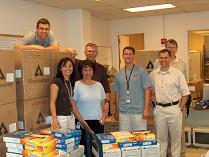
Volunteers from EDS and Weyerhauser prepare donated Microsoft software for shipment to Uruguayan schools. (L-R): Tom Gibson, Angeline Kilby, Karen Wehmann, Don Wehmann, Jon Sorenson, Ron Wehmann, Rick Gartner.
MONTEVIDEO, Uruguay, Sept. 13, 2004 —
— Last week, President Jorge Batlle Ibanez of Uruguay formally accepted a donation of 500 PCs for the country’s schools and learning centers. The donation came from Weyerhaeuser, an international forest products company employing 55,000 people in 18 countries, with additional contributions by Microsoft, Dell, Hewlett-Packard, Office Depot and EDS. At the ceremony, President Batlle was presented with one of the computers, sealed in a box decorated with the signatures of dozens of volunteers who worked on the project.
The donation project began with a commitment made last year by Weyerhaeuser CEO Steve Rogel to President Batlle to send a container load of computers to Uruguay. Weyerhaeuser’s Common Operating Environment project, in which 70 percent of the desktops in the company were replaced, made available a large number of PCs for donation early this year.
Weyerhaeuser approached Microsoft, Dell, Hewlett-Packard, Office Depot, EDS, P & O Nedlloyd and Global Forest Partners for assistance with the project. As a result, the computers shipped to Uruguay were equipped with Microsoft software, including Spanish editions of Microsoft Windows XP, Microsoft Office 2003 and Encarta 2004; Spanish-language keyboards and mice provided by Dell; printers donated by Hewlett-Packard; and printer cartridges supplied by Office Depot. EDS contributed configuration services and support, and various volunteers spent over 1,000 hours configuring and packaging the donated PCs. Global Forest Partners provided financial support, while P & O Nedlloyd donated shipping from the U.S. to Uruguay.
“It was rather magical, the way it all came together,” says Graham Vanderhoek, the project coordinator at Weyerhaeuser. “Everyone was very happy to contribute.”
The PCs will be distributed to 106 schools and learning centers that promote high-tech access for young people in the Uruguayan departments of Rivera, Tacuaremb and Paysand. Schools were selected on the basis of such factors as size, access to electricity and security. Over 32,000 children who might not otherwise have access to technology stand to benefit from the donation.
“It was an incredibly rewarding project to be part of,” says Vanderhoek. “It was labor intensive, but being able to collaborate with the various companies, working with the people who participated, and knowing how many children will benefit, made it all worthwhile.”




